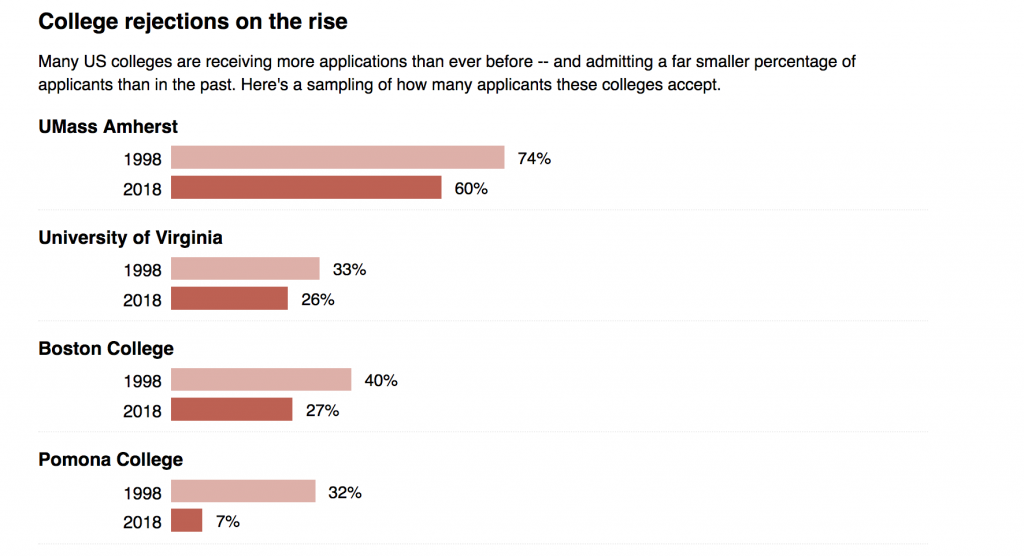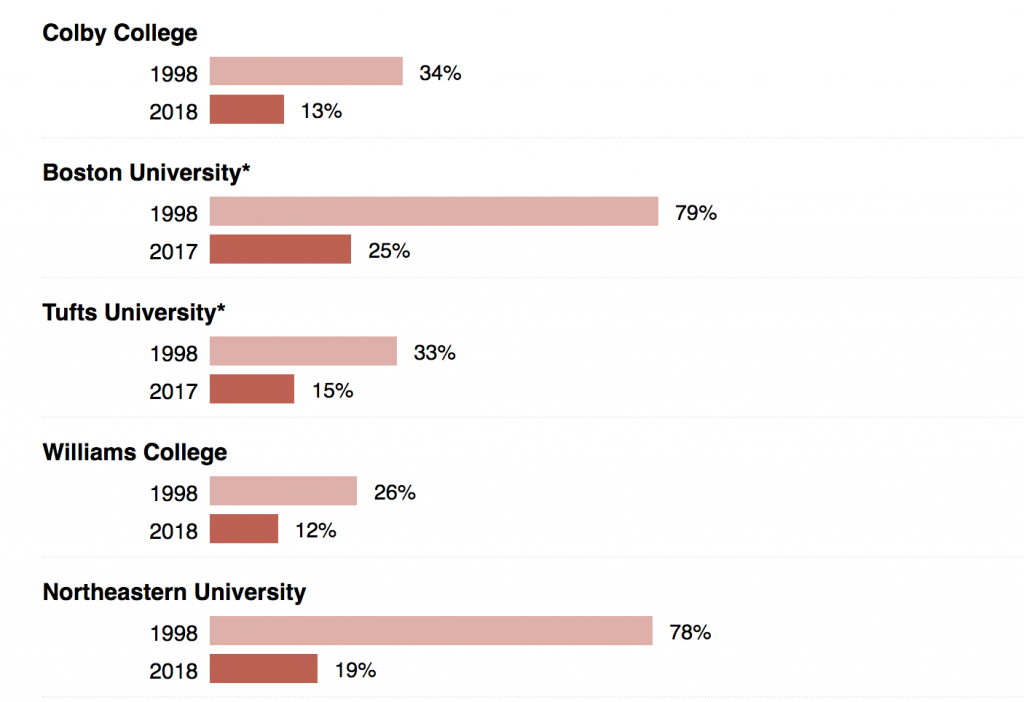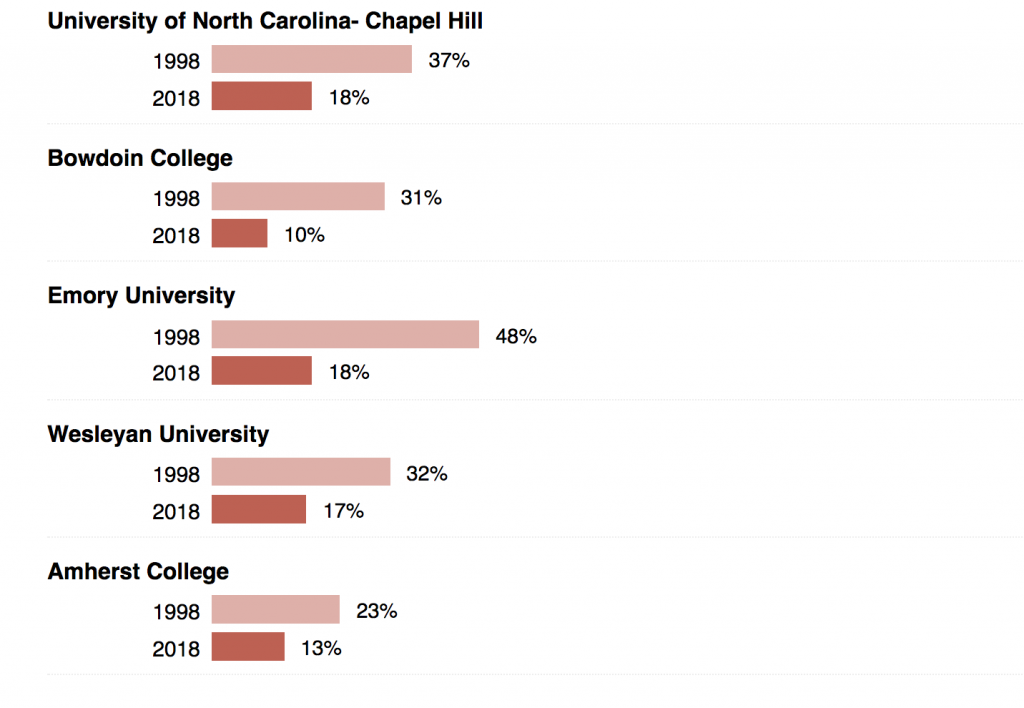
I only have two or three students apply to Georgia Tech each year, and even if I have zero I will continue to read their blog. This is one of many posts that sums up why. Amazing advice if you are starting (or even right in the thick of) the college admission process. Follow this blog!
—
A few weeks ago, my wife called me at work around 2 p.m. This is not typical.
“Hey, what’s up?” I answered.
“Walter (our neighbor) is walking around his house with a clipboard,” she said.
“Weird.”
Not catching my sarcasm, she replied, “I know, right? Do you think they’re moving?”
“I don’t know. Maybe he has taken up sketching. I’ll see you around six.”
But like so many times before, she was exactly right. The next day there were guys pressure washing and painting. Within a week, red mulch was spread around the yard, and a bunch of boxes went out to a mobile storage unit. Next came the “Coming Soon” sign, which a week later turned to “Just Listed.”
Since that day there have been regular showings, real estate caravans, and cars slowly cruising past the house. If you have ever sold a house, you know how all-consuming it can be. First you have to prepare to sell, which includes all the things our neighbors have been doing recently: de-cluttering inside; touching-up outside; and buying decorative items for show like doilies (things you would never actually use in day-to-day living). Once on the market, you are at the mercy of potential buyers. I distinctly remember this from a few years ago when we moved. “Someone wants to come see it at 8 a.m. on Saturday,” our real estate agent would say. We’d clean up the kids’ toys, wipe down the counters, throw about three boxes of stuff we did not have a place for into the back of the van and go eat the All-Star Breakfast at Waffle House (that part was actually okay). “Someone wants to come at 1 p.m. on a Tuesday,” “Let’s have an open house Sunday from 1-4 p.m.,” “Look out your window. Yeah, those folks want to see it now!”
Let’s not forget you also have to move somewhere. The buying side can be worse. You download every possible real estate app: one from your realtor, not to mention Zillow, Redfin, Trulia, Falsia. Whatever you can find. You set your parameters on the number of bedrooms, bathrooms, location, price, and so on. Then the notifications start coming… or they don’t. Either way it is maddening. If you are moving locally, every trip to the grocery store becomes a detour “just to see if anything has popped up” (as if your realtor’s search would not have caught that). You become the one that is manic about getting in to see houses before other potential buyers. You are the one in the driveway asking to “see it now!”
Conversations over meals are about houses and prices and what else might come up next week. Everyone in the family (even ones who are not going to live there and don’t even visit regularly) have an opinion about how you’ve priced your house and what you need in the next home.
We’re Moving!
If you are a high school senior, all of this may sound familiar. Every time you get home there is another glossy, shiny brochure telling you with a $75 fee and a few essays you might be able to move in for four years. You have also been “caravanning” around to colleges and creating pro/con lists about size, price, location, and other factors. Like the real estate apps and websites, I’m guessing you also have found conflicting information and question the accuracy or relevance of data like test score ranges and admit rates. Everyone from coaches to aunts to random baristas are asking you questions and expressing their opinions about which place you should choose, what schools are overpriced, or which ones are unwarranted in their popularity. It’s uncertain and protracted. Let’s face it, as humans we just hate the waiting. For too many students and families the college admission experience, like the home buying and selling process, can be exhausting, maddening, and not a lot of fun.
I’m here to tell you there is a better way. You have a choice. Since I was recently trying to teach my kids the concept of alliteration, I present to you “The Three T’s.”
1 – Time. It is incredibly easy to let the college conversation permeate life, especially as a high school senior. Where are you applying? Did you write your essay yet? Aren’t we visiting Northwestern next month? When is that financial aid deadline? Did you see that brochure from U Conn? Left unchecked these queries and conversations are like incessant Zillow notifications: after practice; on the way home from school; during breakfast, or when you are just sitting on the porch trying to relax.
I propose you and your family allocate just three hours a week to college applications and discussions. Sunday afternoons from 2-5 p.m., Thursday nights from 6-9 p.m. Find a time that works. You do you (Southern Translation: Y’all do y’all). Protect your time, and protect your sanity.
Here is how this works:
PARENTS: This is your time to bring the brochures you’ve noticed in the mail and say, “Hey, look honey, the leaves are turning in South Bend. Isn’t it pretty?” You get to ask, “Have you written your supplemental essays for SMU?” Or “Do you still want to take that trip to California to look at schools in November?” It’s all fair game.
Outside of that time, college talk is banned. Drive past a car with a University of Colorado sticker? Not a peep. Sean next door gets accepted to Auburn or Washington State? Mute button is on.
STUDENTS: You don’t get to bring your cell phone, crunchy snacks, or a bad attitude. Three hours a week. You come ready to string multi-syllabic words together and use intonation. No shoe gazing. You are committed to being fully engaged in the conversation because it’s the ONLY ONE! One time a week… only three hours (1/8 of one day). You got this!
Three hours a week is also plenty of time to get college applications done (just not the last three hours before the deadline!). If you use three good hours for several weeks, you can absolutely do a great job and in truth, your essays will be better having re-visited them in multiple sittings. There is a lot to say for letting something sit for a week and then coming back to it with fresh eyes, some sleep, and a new perspective.
Note to students: I know sometimes your parents’ questions and opinions can sound like nagging or overreach. See that for what it really is—love and deep affection in disguise. The thought of you heading to college brings a crazy mixture of emotions, and frankly sometimes they are still trying to reconcile you are taking AP Biology or standing at over 6 feet tall. Somehow, carpool lines and tricycles do not seem like that long ago. Give them a break. Fear, excitement, love—these all warrant your being fully engaged. Three hours is less than 1.8% of your week. Phone down. Answer their questions—and every now and then, how about a hug?
2 – Talk. One of the main issues with home buying and selling is how public it becomes. Everyone can see pictures, prices, statistics about square footage, and the number of bathrooms on flyers and online. Neighbors are chatting in the streets about why someone is moving, when the house will sell, who might move in, and if it is over or under priced. After the sale is finalized, that too is public information—setting off another wave of gossip. That type of unnecessary, unhealthy, and unbridled noise can also occur in your admission experience if you share too much publicly. I strongly encourage you to consider how much you are going to volunteer with friends and online about where you are applying, because that opens you up to questions later about whether you are admitted, deferred, denied, or waitlisted.
Students, consider holding this process a little closer to your vest (or sweater or shirt for non-vest wearers) and only letting in a very small subset of trusted people. Parents, commit (before any admission decisions are released!) to not adding to the speculation and consternation surrounding college admission by sharing stories at parties or games or online about where your son or daughter is admitted, denied, or offered scholarships. Keeping decisions and deliberations private has incredible potential to build trust and bond your family in what should be a very personal process. Taking this a step further, do not ask others about their college admission decisions. Not only is it really none of your business, but typically the information shared is exaggerated or inaccurate. Sorry, but sometimes… people, you know?
3 – Trust. Paranoia often surrounds buying and selling a house making it even more all–consuming. We are not going to be able to sell our house for the amount we want. I just know we are going to get outbid. There are almost no houses for sale and lots of people buying in that neighborhood. All of this, again, is extremely similar to college admission. There are thousands of applicants for a limited number of seats in classes. You apply (make an offer) and then have to wait anxiously to see if you are going to be admitted (offer accepted). With tens of thousands of dollars involved and a potential move out-of-state, it’s expensive and emotional.
I am asking—scratch that—I am telling you this is all going to work out. How do I know? Last Sunday, we hosted a program at Tech called Give 1 Get 1. Before Convocation, students brought shirts from other colleges where they visited, applied, or were admitted. That day we got lots of different shirts, saw lots of different faces, and heard lots of different backgrounds and stories about how they arrived at Tech. They were bonded by one commonality—they were all excited to be on campus and get started with their college career. This is the beautiful and inevitable other side I described a few weeks ago.
Trifecta: Combining the 3 T’s
Anyone who has bought or sold a house has had some disappointments and made some adjustments during the process. With so many variables in timing, pricing, and other buyers and sellers, things never go exactly as you hope or plan. But they will also tell you that a house becomes a home because you move into it. You make it yours.
The truth is there are lots of great colleges in the nation where you could move in, succeed, and be thrilled with the community—where you could make friends, do well, be happy, and thrive. Right now these places are just names and addresses—don’t place any more emotional attachment on any one of them than that. Talk to friends this year when they come back from college for Thanksgiving or Winter Break. Ask them where they thought they would be a year prior—for many their current school was not their first choice or even on their radar. But then they moved in. They made it their home. And so will you.
Time, Talk, Trust. Apply these well and behold the power of alliteration, my friends!
If you would like to subscribe to receive blog entries when they post, please enter your email address above, or click the “Subscribe” button in the header at the top of this page. We also welcome comments or feedback @gtadmission on Twitter.












